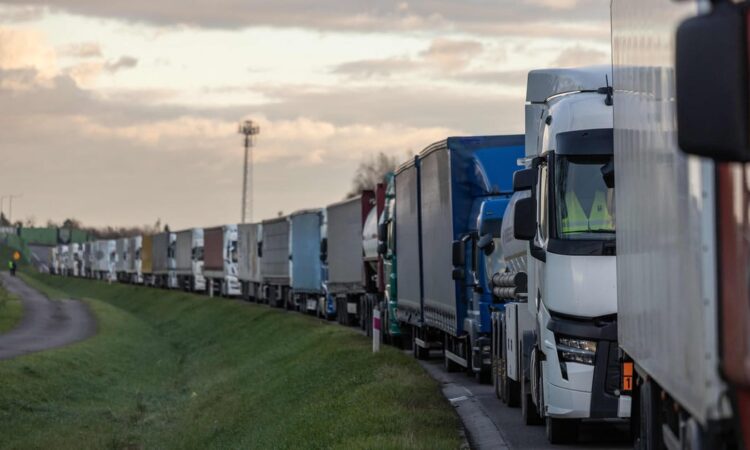
WARSAW — Polish truckers are blocking border crossings with Ukraine to protest an EU deal that allows easy access for much cheaper Ukrainian drivers into the bloc.
This follows a Polish ban of Ukrainian grain imports to protect farmers from an influx of cheap produce from its war-torn neighbor.
Unlike the grain blockade, which was imposed by the Polish government, the trucker protests aren’t sanctioned by Warsaw.
Starting Monday, the protesters blocked three key border crossings at Dorhusk-Yagodin, Korczowa-Krakovets and Hrebenne-Rava-Ruska and said they’re going to halt commercial traffic until the government in Warsaw and decision-makers in Brussels restore limits on transport operations for Ukrainian haulers that used to be in place before Russia invaded Ukraine last year.
“We’re going to do it the way farmers did — keep protesting until the government acknowledges there is a problem and does something about it,” said Jacek Sokół, who owns a small trucking company in Łuków in eastern Poland, and helped organize the blockade.
The Polish transport industry says that this year so far, Ukrainian trucks have crossed the Polish border close to 900,000 times while before the war only around 180,000 trucks a year crossed into Poland.
Protesters at the crossings plan to allow only one truck to pass every hour except for vehicles carrying humanitarian and military help, animals, or perishable products; passenger cars will also be allowed.
The Polish and Ukrainian governments as well as the European Commission are calling for the protesters to let the trucks through.
“I totally discourage this kind of behavior of blocking a border. It’s not something very European,” Transport Commissioner Adina Vălean told POLITICO.
“We call on the Polish protesters to stop the blockade of the border and choose other forms of defending their rights that would not impede movement across the border,” Ukrainian Ambassador to Poland Vasyl Zharych said in a statement Monday. “Such methods only play into the hands of our common enemy, the Russian terrorists, and harm the interests of not only Ukraine but also Poland and the whole of Europe.”
Poland’s ministry of infrastructure said in an emailed statement: “The Minister of Infrastructure sent a letter to the members of the protest committee, urging them to lift the blockade.”
Warsaw insists that it can’t undermine an EU deal, extended to next June, that allows shippers to carry cargo between Ukraine and an EU country without additional paperwork, but doesn’t allow Ukrainian truckers to pick up and drop off loads within the EU.
“The agreement was struck by the EU so as long as it is in force, member states cannot enter into other agreements with Ukraine. In practice, this means that Poland cannot introduce a mandatory permit system with Ukraine before the expiration of the agreement,” the ministry said.
Brussels is standing by the agreement, which was also struck with Moldova.
“We support the solidarity lanes which we have created to prop up Ukraine and Moldova in their export and import activities,” Vălean said. “We are working on a dialogue with all the involved parties because I don’t think the Polish transport companies will have much to worry about the competition coming from Ukraine.”
Competition concerns
But Polish truckers are much less relaxed about cheaper rivals from the east — in much the same way that West European transport companies tried to block the flood of competitors from Poland, Romania and Lithuania after their countries joined the EU and undercut their prices.
They complain that Ukrainian truckers are also transporting goods between points within Poland — known as cabotage — as well as carrying cargo between Poland and third countries.
“I have a small company. I’ve had to reduce my fleet by 40 percent to just eight trucks this year because the Ukrainian do cabotage so much cheaper,” Sokół said, referring to the ability of truckers to pick up additional loads while traveling in the EU.
Truckers staged similar protests in May.
The current protest is taking place during a political transition in Poland, as the right-wing Law and Justice party government, in power since 2015, makes way for an opposition coalition — although the process isn’t likely to be completed until late December.
“This protest has fallen into a decision vacuum as the old government is on its way out and the new one hasn’t taken over yet. It’s a spontaneous action since people have simply had enough,” said Maciej Wroński, CEO of Polish Transport and Logistics, a lobby group.
But the lack of decision-makers in Warsaw — the old government will formally resign on November 13 — makes it difficult to tackle the strike.
“The government can’t simply wash its hands off it and say that it’s the EU calling the shots here. It’s the government’s role to present the EU with the problem and help it find a solution that’s good for the Ukrainian economy but doesn’t harm the Polish economy. Right now, Ukrainian truckers can just haul cargo across the EU unimpeded,” said Wroński.
For Ukraine, already smarting over the impact of Poland’s grain ban, the border protests are adding to the country’s difficulty in exporting goods needed to keep its wartime economy afloat.
“Polish transporters blocking the roads to the border crossings between Poland and Ukraine … is a painful blow to the back of Ukraine, which is suffering from Russian aggression. The corridors of solidarity between Ukraine and the EU passing through the territory of Poland are under threat,” Zharych said.
Veronika Melkozerova reported from Kyiv and Jeremy Van Der Haegen from Brussels.






